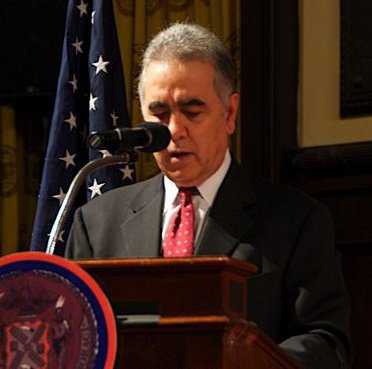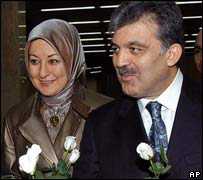
|
By Jonathan Head
BBC News, Ankara |
Kenan and his colleagues huddled around a wood-fired stove, rubbing their hands to ward off Ankara’s bitter winter chill, and sipping tea.
They were angry, so angry that it was difficult to get them to speak one at a time.
“Our prime minister is crazy”, said Kenan, “he’s such a bully. You can’t run a state like this.”
The seven men in Kenan’s tent were tobacco workers from Izmir.
All around them, filling Sakarya Street – normally the site of central Ankara’s main market – were other tents, each from a different district of Turkey.
Adana, Adiyaman, Batman, Bitlis… more than 50 places represented in all.
The protest started in December when the government announced that more than 10,000 workers, in what was left of the once-dominant state tobacco monopoly Tekel, would lose their jobs.
Most are manual labourers from the tobacco distribution centres – the state-owned tobacco processing factories were privatised and sold to British American Tobacco two years ago.
Sustained protest
The remaining workers have been offered alternative employment in the state sector, but only on short-term contracts, without benefits and at much lower wages.
|
The state’s role should be to provide basic services, and the word ‘basic’ is important here
Bulent Gedikli
Economic advisor and MP |
With thousands joining their regular street protests, it has been the most sustained industrial unrest to confront the government of Prime Minister Recep Tayyip Erdogan since he was first elected in 2002.
A group of men from Batman in the south-east explained what this meant for them.
“My salary is 1,400 lira ($950) a month”, said one.
“Under the new contract I would get only half that. They give us 11-month contracts so we never know if we will have a job the next year. We cannot see any clear future for ourselves.”
The government argues that it is being generous in conceding even this much.
After all, it points out, unemployment has hit 14% in Turkey, and millions of people earn even less than the salaries these tobacco workers are being offered.
Driven by business
“The state should not be a manager, it should not be involved in trade or running companies”, says Bulent Gedikli, a member of parliament from the governing AK Party (AKP) and an economic advisor to the prime minister.
“The state’s role should be to provide basic services, and the word ‘basic’ is important here.”

The AKP’s new headquarters towers over its surroundings
|
From its shiny new headquarters that towers over the squat, 1930s buildings of Ankara, the AK Party is projecting a very different vision of Turkey than the one envisioned by the country’s founding father, Ataturk.
Often described as Islamist because of the conservative religious habits of its leaders, the party is actually driven at least as much by business as by faith.
Prime Minister Erdogan is more of a Margaret Thatcher than an Ayatollah Khomeini.
“The AKP is in favour of the market, against state enterprises – they have a prejudice that everything the market does is proper and just and successful”, says Professor Burhan Sanatalar, an economist at Istanbul’s Bilgi University.
“The revenue side is also very important to them”, he says.
“From the 1980s to 2008 privatization generated around $36bn, and 70% of that has been received during the AKP’s period in government.”
“Statism”
The AKP’s approach has helped generate impressive economic growth over the past decade, and spawned hundreds of successful new private businesses.

Tekel workers say they will no longer vote for the AKP
|
But in a country where the state has dominated so much of life since the founding of the Turkish republic 87 years ago, it has also come as a shock to many Turks.
Back in 1931 Ataturk announced his “Six Arrows” – the six principles that he believed should underpin the character of the nation.
One was “statism”, a belief that the state should play a leading role in Turkey’s economic development.
Even as late as the mid-1990s, more than half a million people were employed by state enterprises, about 20% of the industrial workforce.
One of the areas brought under state management was tobacco and alcohol, in the huge monopoly known as Tekel.
Once the country’s most important agricultural crop, by 1980 the tobacco monopoly employed more than 50,000 people.
However that number dropped as the government sold off manufacturing plants to multinational corporations.
Ataturk and raki
Not far from where the Tekel workers were holding their sit-in, stands the first factory built in Ankara on the orders of Ataturk, at the start of his mission to modernise and industrialise his country.
Now it is deserted, awaiting a buyer. But you can still see the giant wooden barrels that indicate what it once was – a Tekel distillary.

The Tekel distillery – now deserted – was Ankara’s first factory
|
A keen drinker of raki – an aniseed spirit popular in Turkey – Ataturk’s choice for his country’s first step into the industrial age also reflected his determination to push back the influence of Islam.
Upstairs they still preserve the rooms, and their art deco furniture, where the great man used to sit with his friends and colleagues, drinking and planning his new state.
You can hold the large tin ladle with which he sampled the produce.
Back on Sakarya Street, the last beneficiaries of that statist dream queued up at soup kitchens set up by volunteers to support the protest.
A few days after my visit they suspended their sit-in, still hoping to wring more concessions from the government.
The wave of public sympathy for the Tekel workers has certainly caught the government off-guard, but it will not budge from its basic position.
The workers will lose their health and other benefits, and they will lose their job security.
Many of the disillusioned Tekel employees say they voted for the AKP in the last two elections – never again, they say.
But they are a diminishing force in today’s Turkey.
The days when millions of Turks could expect the state to look after them seem to be over.
http://news.bbc.co.uk/2/hi/europe/8579872.stm






